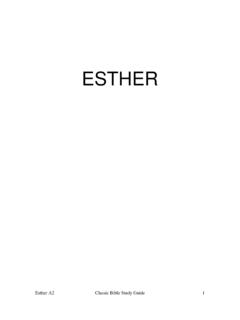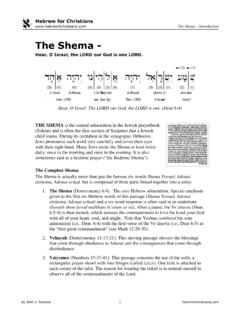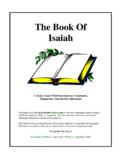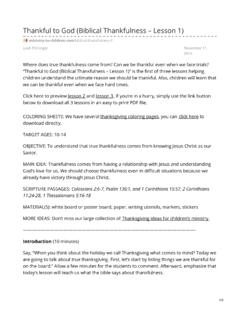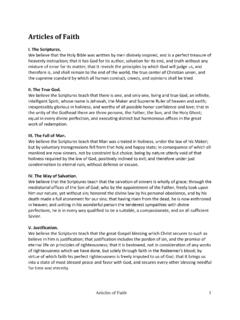Transcription of DEUTERONOMY - Classic Bible Study Guide
1 DEUTERONOMY A2 Classic Bible Study Guide 1 DEUTERONOMYD euteronomy A2 Classic Bible Study Guide 2 INTRODUCTION The book consists of four parts: 1. An introductory address delivered by Moses on the plains of Moab, containing a recapitulation of the principal events of the history and closing with a solemn charge of obedience and faithfulness to God. This is recorded in the first four chapters, commencing with 1:6, and closing with 4:43. This might be called retrospective. 2. Then follows a long address from 4:44 to 26:19, which might be called didactic and hortatory. This consists of a summary of the principal precepts of the Law, and a collection of important statutes and laws, with respect to their national and individual life; especially when they enter the Land of Promise.
2 This is interspersed with several brief narratives respecting a portion of their wilderness life already past. 3. Then follows a shorter address from 27:1 to 30:20, mostly prospective in its character: referring, especially, to the inscription of the Law on pillars of stone on Mounts Ebal and Gerizim, with the blessings and the curses after they should enter the land. This is followed by a solemn declaration of the punishments and recompenses which will most surely follow their disobedience or obedience to the commandments of God, and a solemn appeal to them, as a people, to choose the way to obedience and life. 4. The last section of DEUTERONOMY , comprising chapters 31-34, contains a brief account of the closing scenes of Moses' life, including the appointment of Joshua, provision for the reading of the Law, the song of Moses and his parting blessing upon the tribes, closing with the account of the death, burial and eulogy of the great lawgiver.
3 Some of Christ's most important quotations from the Old Testament were directly from the book of DEUTERONOMY . He uses the authoritative expression, It is written," as He quotes from DEUTERONOMY 8:3; 6:13, 16, on important occasions (Matthew 4:4, 7 and 10). So, again, Matthew 22:24, compared with DEUTERONOMY 25:5. So again, Matthew 19:7-8; Mark 10:3-4; John 5:46-47. Again in Acts, Peter quotes from this book (3:22-23); Stephen also (7:37); and Paul (Romans 10:19; 12:19; Galatians 3:10). (The Christ in the Bible Commentary, A. B. Simpson) DEUTERONOMY A2 Classic Bible Study Guide 3 DEUTERONOMY 1:1-4:43 MOSES S FIRST ADDRESS ON THE PLAINS OF MOAB DEUTERONOMY 1:1-4:43 Retrospective This address is introduced in the five opening verses of the book by a simple historical reference to the circumstances in which it was given.
4 It was spoken on the plain of Moab "in the fortieth year, on the first day of the eleventh month" ( DEUTERONOMY 1:3), after their victory over Sihon, king of the Amorites, and over the king of Bashan. It contains a striking little parenthesis which is more emphatic than the whole chapter (verse 2): "It takes eleven days to go from Horeb to Kadesh Barnea by the Mount Seir road." This little sentence stands in contrast with the 40 years of their wandering, and is a hint of what might have been had they promptly believed and obeyed God. Alas! many a journey in our Christian pilgrimage is made a thousandfold more sad and long by our refusing to obey the Lord.
5 The address proper consists of two portions; first, a recapitulation of their history up to the present time (1:6 to 3:29); and secondly, an exhortation to obedience (4:1-43). SECTION 1 Recapitulation DEUTERONOMY 1-3 Departure From Horeb Moses goes back to their departure from Horeb (1:6-8), and their setting out for the land of promise. "You have stayed long enough at this mountain" (1:6) is the Lord's message. Break camp and advance into the hill country of the Amorites; go to all the neighboring peoples in the Arabah, in the mountains, in the western foothills, in the Negev and along the coast, to the land of the Canaanites and to Lebanon, as far as the great river, the Euphrates.
6 See, I have given you this land. Go in and take possession of the land that the LORD swore he would give to your fathers to Abraham, Isaac and Jacob and to their descendants after them. (1:7-8) Here there is no long interval, no weary wilderness march even suggested; the land is right before them as God's immediate purpose for them to inherit; and back of the command stands the oath of God to their fathers. It was well that it was so, for had it not been for their sakes the promise would have been of no effect; but when they forfeited their claim, the covenant with Abraham still stood fast, and by virtue of it their children entered in. It is well for us that the covenant is not with us and the mercy of God is not for our sakes, but wholly on account of the Lord Jesus Christ, our covenant Head.
7 "For God's gifts and his call are irrevocable" (Romans 11:29). Organization Of The Camp Moses next refers to his plan for the organization and government of the host. The multitude had grown so vast that it was necessary that there should be a system of administration in detail. This was rendered the more necessary by what Moses pathetically refers to as their burden and their strife. Alas! it was this element of human self-will, discontent and murmuring, which caused most of his burdens and their sorrows. This, alas! is still true. It is not our troubles that burden the Master, but our strife. To meet the innumerable cases of complaint and litigation that would arise, Moses appointed judges and commanders "of thousands, of hundreds, of fifties and of tens" ( DEUTERONOMY 1:15) and laid upon them the most solemn charges with regard to the patient and righteous administration of justice in all the minor difficulties that might arise.
8 He reserved to himself for personal decision the cases that might prove too complicated for them. We have here a wise example of the importance of a careful, thorough organization in the work of the Church of Christ. George Whitefield once said: "The Lord gave me as great a work as John Wesley, but he organized and I did not; the result was his became an enduring system, and mine, so far as visible and organic results were concerned, a rope of sand." Through The Wilderness He next recalls their journey through the wilderness from Horeb to Kadesh Barnea. "Then, as the LORD our God commanded us, we set out from Horeb and went toward the hill country of the Amorites through all that vast and dreadful desert that you have seen, and so we reached Kadesh Barnea" (1:19).
9 The remembrance still seems to cause a shudder of horror as he speaks of the great and terrible wilderness. Like them we too must pass into our inheritance through a waste and desolate region of separation from the world and crucifixion with Christ. But it need not be long. It was only 11 days' journey, and it was utterly unnecessary that they should return to it again and again and wander in it for the remaining 40 years. And so we too must pass through the earlier conflicts which meet us into a deeper rest; yet the ordeal need not be long, and certainly need not be renewed and DEUTERONOMY A2 Classic Bible Study Guide 4 prolonged through all the weary pilgrimage of life.
10 He that is brave enough to pass quickly through the border land and utterly to follow the Lord will find that this is the secret of a peaceful and happy life, free from the struggles and conflicts which should be settled at the beginning. But he who is afraid utterly to die and wholly to obey will find his whole life a long and ineffectual struggle of useless misery. The Crisis The crisis of their history has now come. Then I said to you, "You have reached the hill country of the Amorites, which the LORD our God is giving us. See, the LORD your God has given you the land. Go up and take possession of it as the LORD, the God of your fathers, told you. Do not be afraid; do not be discouraged.
